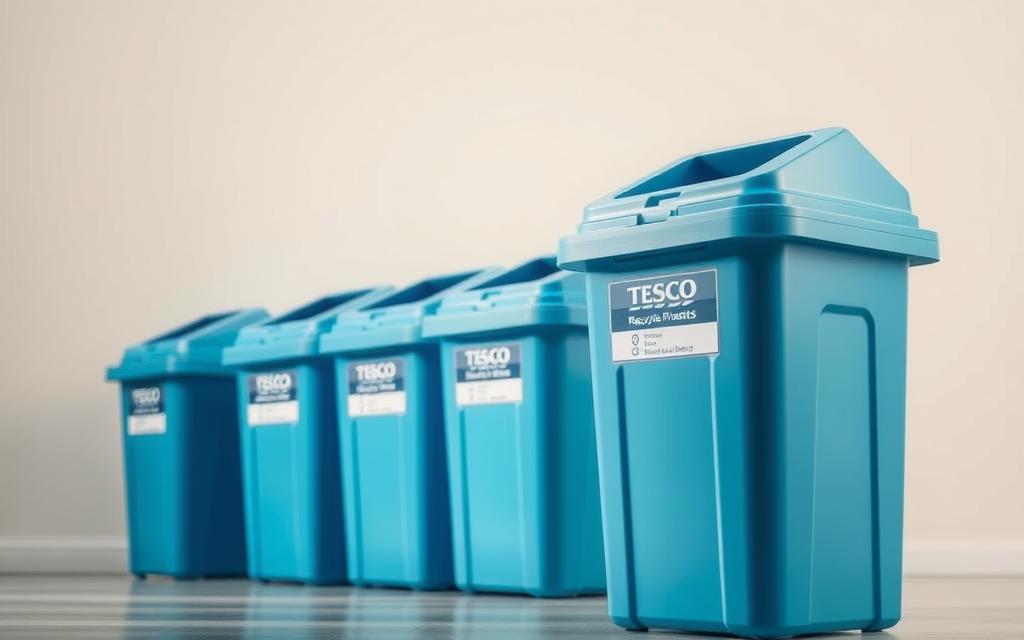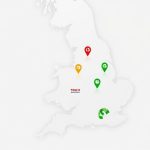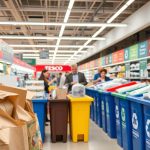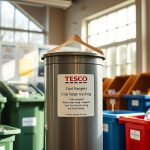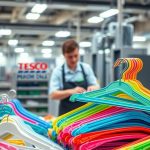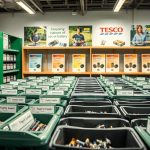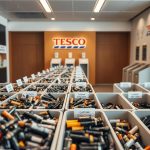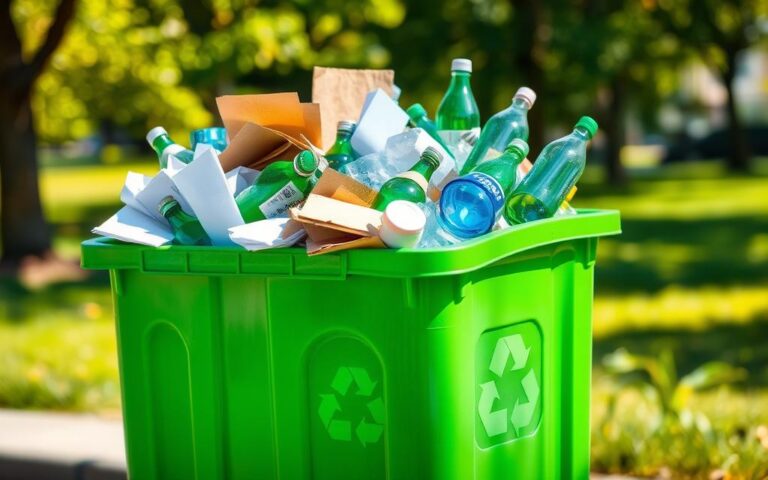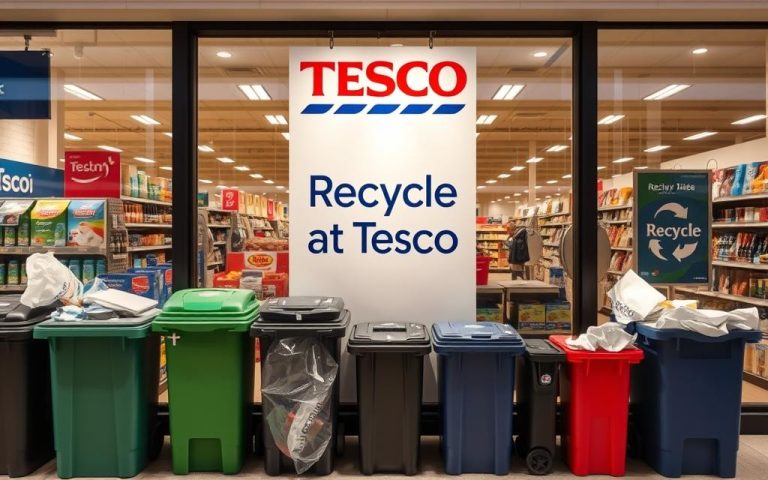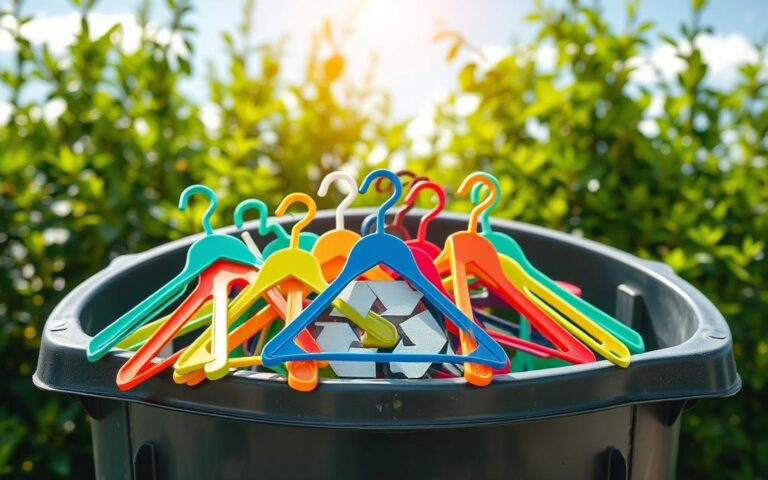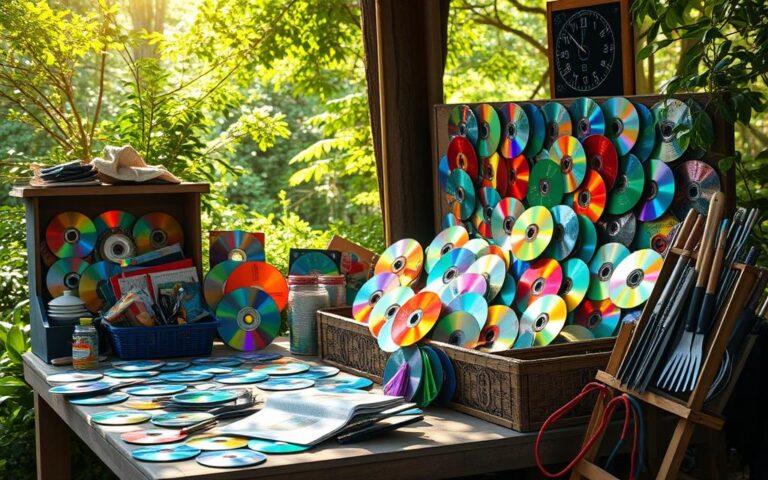Recycling Bins at Tesco: Convenient Store Locations
Tesco is revolutionising plastic waste management in the UK with innovative recycling bins. The supermarket has set up Tesco recycling points to tackle hard-to-recycle soft plastics. These bins offer a handy solution for tricky plastic materials.
The soft plastic recycling programme began with 171 stores in a trial. It’s been a smashing success, especially in Wales and south west England. About 85% of customers said these recycling points improved their habits.
Customers can now drop off soft plastics like bread bags and crisp packets. These items would typically end up in landfills. Tesco’s commitment to sustainable waste management is clear in this initiative.
Tesco aims to collect and recycle 1,000 tonnes of soft plastic yearly. This is crucial, as only 6% of problematic plastic is recycled in the UK. Soft plastics make up nearly 25% of all plastic packaging by weight.
These recycling bins are a big step towards a circular economy. They’re helping to reduce plastic waste across the United Kingdom. Tesco’s initiative is making a real difference in our environment.
Understanding Tesco’s Recycling Programme
Tesco’s comprehensive recycling programme tackles plastic waste and promotes sustainable practices. It addresses the critical challenge of packaging waste in retail. This initiative showcases Tesco’s commitment to environmental responsibility.
The innovative 4Rs strategy forms the core of Tesco’s environmental approach. This structured method aims to minimise plastic waste effectively.
- Remove: Eliminating unnecessary packaging
- Reduce: Minimising packaging materials
- Reuse: Encouraging reusable packaging solutions
- Recycle: Facilitating effective recycling processes
Environmental Partnerships
Tesco collaborates with leading environmental organisations to boost its recycling efforts. These partnerships have led to innovative initiatives, like soft plastic collection points in 171 new stores.
Impact on Plastic Waste Reduction
Tesco’s recycling programme has a significant impact on plastic waste reduction. The company expects to process 1,000 tonnes of soft plastics annually. This effort is crucial, as half of supermarket packaging remains difficult to recycle.
Tesco accounts for approximately 13% of local authority bring bank recycling in the UK, demonstrating their substantial contribution to national recycling efforts.
Customer response has been overwhelmingly positive. Initial trials showed people returned ten times more plastic than expected. This engagement highlights the potential for widespread adoption of retail recycling programmes.
Recyclable Materials Accepted at Tesco Stores
Tesco has transformed in-store recycling with its soft plastics programme. The retailer now offers solutions for materials that local councils often struggle to recycle.
Tesco’s recycling scheme targets a wide range of soft plastics. These items are typically difficult for households to dispose of responsibly.
- Crisp packets
- Bread bags
- Cling film
- Pasta packaging
- Salad bags
- Plastic film wrapping
The scope of Tesco’s recycling initiative is remarkable. Nearly 200 Tesco stores across the UK now have recycling drop-off points. These locations have collected over 500 tonnes of soft plastics.
Only 13% of local councils recycle cling film, which underscores the critical importance of Tesco’s recycling scheme.
Customers can easily join in by bringing clean, dry soft plastics to collection points. This helps Tesco reach its goal of collecting 1,000 tonnes of soft plastics yearly.
Tesco’s efforts go beyond collection. The retailer has removed a billion plastic pieces from its operations. It has also cut plastic packaging by about 3,500 tonnes each year.
Recycling Bins at Tesco: Store Network Coverage
Tesco leads in sustainable waste management across the UK. Nearly 200 stores offer convenient recycling points. Customers can easily contribute to environmental conservation while shopping.
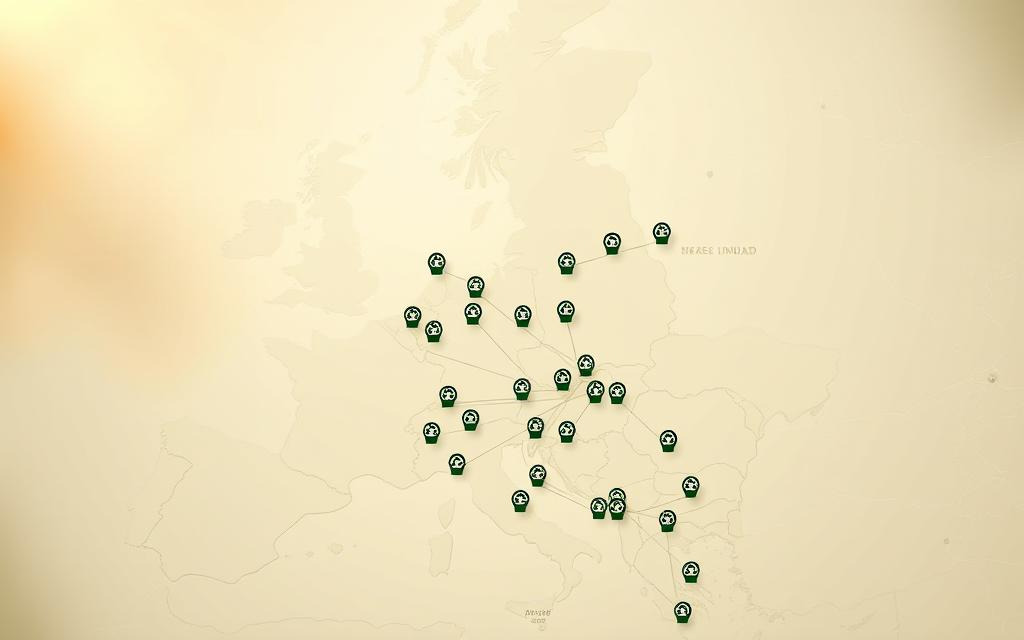
Finding Tesco recycling locations is simple with their store locator tool. This digital resource helps customers find the nearest collection points. It’s an efficient way to locate recycling bins in your area.
Comprehensive Coverage Across Regions
Tesco’s recycling network covers key areas. Their presence is significant in:
- South West England
- Wales
- Major metropolitan areas
Finding Your Nearest Recycling Point
To find a Tesco store with recycling facilities, follow these steps:
- Visit the Tesco store locator website
- Enter your postcode or city name
- Filter results for stores with recycling points
- Check available recycling materials at each location
“85% of customers at Tesco trial stores reported that the recycling points helped them recycle more.” – Tesco Sustainability Report
Recycling Locations Breakdown
| Region | Stores with Recycling Points | Typical Materials Accepted |
|---|---|---|
| South West England | 42 | Soft plastics, aerosol cans |
| Wales | 28 | Plastic packaging, aluminium |
| Major Cities | 130 | Comprehensive recycling options |
Recycling at Tesco makes reducing plastic waste easy. Customers can support environmental sustainability during their regular shop. It’s a simple way to make a positive impact.
Environmental Impact and Processing
Tesco’s recycling programme tackles the global plastic waste challenge head-on. Only 9% of plastic ever produced has been recycled. The retailer’s soft plastic processing initiative is a vital environmental effort.
Tesco’s recycling impact extends beyond basic waste management. Since 2019, Tesco has removed over 2.3 billion pieces of plastic from its UK operations. This shows their strong commitment to fighting plastic pollution.
- Removed over 55 million pieces of soft plastic from pocket tissue multi-packs
- Transitioned 10 product lines to 100% recyclable paper packaging
- Reduced plastic in pasta packaging by over 30 tonnes annually
“Our commitment is to transform how we handle plastic waste and support a more sustainable future,” says a Tesco environmental spokesperson.
The World Wide Fund for Nature (WWF) backs Tesco’s efforts in soft plastic processing. However, research reveals challenges in the recycling process. Only 17 out of 40 GPS trackers on recycled plastics reached their final destination.
Tesco keeps innovating despite these hurdles. Their luxury soft toilet rolls now use recycled cardboard materials. This new process uses less water, chemicals, and energy than traditional methods.
Future Plans and Expansion
Tesco’s bold sustainability approach includes ambitious recycling expansion strategies. The retailer aims to revolutionise its environmental impact through innovative plastic reduction goals. These forward-thinking initiatives will transform Tesco’s ecological footprint.
The company’s future sustainability initiatives focus on several key areas:
- Collecting 1,000 tonnes of soft plastic annually for packaging reuse
- Expanding recycling bin networks across UK stores
- Developing advanced material processing techniques
- Investing in circular economy infrastructure
Tesco plans to implement cutting-edge sorting technologies to boost material recovery rates. They’re also forging partnerships with recycling specialists to enhance their capabilities. These efforts showcase Tesco’s dedication to reducing its environmental impact.
| Initiative | Target Year | Expected Impact |
|---|---|---|
| Soft Plastic Collection | 2024 | 1,000 tonnes processed |
| Recycling Bin Network | 2025 | 50% increased coverage |
| Packaging Reduction | 2026 | 30% less virgin plastic |
These strategic goals align with broader environmental objectives. Tesco is positioning itself as a leader in sustainable retail practices. Their proactive approach signals a strong commitment to environmental stewardship.
Customer Engagement and Education
Tesco has crafted a smart plan to boost recycling awareness and sustainable shopping. They know that teaching customers is vital for their recycling programme’s success. Tesco uses clever methods to change how people think about waste and the environment.
The retailer’s efforts to engage customers include several key actions:
- In-store signage explaining recycling processes
- Clear visual guides for proper waste sorting
- Interactive displays demonstrating recycling benefits
- Digital resources on sustainable shopping practices
Tesco’s “Recycle to Read” campaign shows their dedication to customer education. This programme motivates families to recycle by offering rewards. Schools that take part in toy recycling can earn book vouchers.
| Engagement Method | Target Audience | Key Objective |
|---|---|---|
| In-store Signage | All Shoppers | Increase Recycling Awareness |
| Digital Resources | Online Customers | Provide Sustainable Shopping Guidance |
| School Programmes | Children and Families | Foster Environmental Education |
Tesco leads the way in sustainable shopping by making customer education a key focus. They believe that giving customers knowledge is crucial for real environmental change. This approach helps create a more eco-friendly shopping experience.
Recycling isn’t just about sorting waste—it’s about creating a culture of environmental responsibility.
Conclusion: The Impact of Tesco’s Recycling Initiative
Tesco’s recycling programme has revolutionised the retail sector. Since 2019, they’ve slashed 3,000 tonnes of packaging and 1.7 billion plastic pieces. This showcases their strong commitment to environmental stewardship.
The green initiatives have inspired customers to join the recycling effort. Half of Tesco’s shoppers are keen to help the planet. Another 39% are eager to reuse products.
Tesco’s Loop trial offered 200 eco-friendly items to customers. This proved that sustainable choices can be both accessible and appealing. It’s a win-win for the environment and consumers alike.
Tesco’s approach to sustainability sets a stellar example for other retailers. They’ve invested in automated recycling facilities and innovative packaging solutions. This shows that being eco-friendly can be both effective and profitable.
As shoppers prioritise sustainable options, Tesco leads the way. Their recycling initiative shines as a beacon of environmental progress. It’s a model that other businesses would do well to follow.
FAQ
What types of soft plastics can I recycle at Tesco stores?
Tesco accepts many soft plastics, including carrier bags, bread bags, and crisp packets. They also take pasta, rice, salad bags, and fruit and vegetable packaging. This initiative helps recycle materials that are often hard to process elsewhere.
How do I prepare my soft plastics for recycling?
Clean and dry your soft plastics before recycling. Remove food bits and crumbs. Make sure the packaging is free from dirt or moisture.
Where can I find Tesco recycling bins?
Many Tesco stores across the UK have recycling bins. South West England and Wales have particularly good coverage. Use Tesco’s website store locator to find recycling facilities near you.
What happens to the soft plastics after I recycle them?
Tesco’s recycling partners process the collected soft plastics. These materials become new packaging or other useful products. This process supports a circular economy and reduces plastic waste.
How is Tesco supporting environmental sustainability?
Tesco uses a 4Rs strategy: Remove, Reduce, Reuse, Recycle. They’ve already removed over a billion pieces of plastic. Tesco works with organisations like the World Wide Fund for Nature (WWF) to boost sustainability efforts.
What are Tesco’s future recycling goals?
Tesco aims to collect 1,000 tonnes of soft plastic yearly for reuse in packaging. They’re expanding their recycling bin network. Tesco also explores new ways to cut plastic waste and protect the environment.
Can I recycle other types of packaging at Tesco?
The programme mainly focuses on soft plastics. Tesco is always expanding its recycling abilities. Check with your local store or Tesco’s website for the latest on accepted materials.
How can I learn more about Tesco’s recycling programme?
Tesco offers in-store signs, online info, and educational materials about their recycling initiative. You can chat with store staff or visit Tesco’s website for more details.

